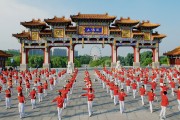The following is Part 2 of a series of articles where we spoke with Michael B. Griffiths, author of ‘Consumers and Individuals in China: Standing out, Fitting in’. Michael is currently Senior Director, Ethnographic Research at Ogilvy & Mather China.
There’s a really interesting story in your book about working at a Chinese hotpot restaurant. Can you tell us more about that?
Sure. A new hotpot restaurant had opened up in Anshan called Lamb Buddha. Opening a hotpot restaurant has been one of the surefire ways to get rich quick in lower tier Chinese cities over the last decade or so. Getting a permit for a restaurant in a place like Anshan where people love eating out — and people certainly have large appetites in the North-East — lends itself to excesses of consumption. It’s either that or KTV, and women.
So, this new hotpot restaurant opened up, and I happened to go there one day with my wife and her parents, and her aunt and uncle. We had just sat down to dine when the uncle said to one of the waitresses, ‘Will you go and let your boss know that the big boss is here’. The rest of us had no idea what was going on and waited to see what he meant.
It turns out that the uncle, who holds a senior position in Anshan’s state owned enterprise monopoly, had been responsible for granting the owner permission to develop his restaurant on these premises. We had thought it was just going to be a little family dinner but the dynamic had totally changed. Before we knew it the owner of the hotpot restaurant came in and effused his delight at seeing the uncle — ‘Oh my god you’re here, you’re here’ — and began to lavish thick books of vouchers to dine at his restaurant, worth 10,000RMB each. He was like, ‘Here’s another book, take these, take these’. We were like, ‘Whoa, your generosity is too much!’. We just wanted to have a family meal but the owner insisted on dining with us.
Eventually I became the focus of attention because I was the only foreigner, and over the next hour or so (this part is in chapter 7 of the book) I was like these two guys, the titan of industry and the almost dodgy hotpot restaurant owner, tried to outdo each other in terms of masculinity and control by competing with me. It’s quite standard in the northeast to exhort others to ‘Eat more, eat more!’ as a sign of your generosity and excess, but on this occasion it went totally out of control. ‘More lamb, more lamb!’ they shouted, as the waitress brought more and more and we ate until we were almost sick.
At one point my wife’s father remarked that I wanted to meet some ‘suddenly rich’ (baofahu) types as part of my research, at which point the uncle said that the restaurant owner was a baofahu, and everyone began laughing. I then said that I’d been encouraged to understand the widest spectrum of Chinese society as I could, including people at the lower echelons of society such as rural migrants. I then asked the restaurant owner if there was any chance that I could come and work in his kitchen for a bit. The owner thought I was joking. There we were having dinner with this really powerful guy, with all this money sloshing about, and the owner was bemused, ‘What? You really want to come here and work?’ He couldn’t understand it! But I assured him, ‘Yes, it’s for real; I want to come and work here.’
The owner then asked ‘Well, what can you do?’ I told him I could wash up dishes; I could do all these sort of simple jobs, maybe not like a skilled task such as cutting the meat strips, peeling the vegetables or preparing the secret recipe sauces, but washing dishes would be fine. Of course, he still thought I was joking but agreed to hire me.
You should have seen his face when I showed up a few days later, reporting for duty! The owner tried to put me in a uniform, for hygiene’s sake; it was quite a hygienic place compared to some kitchens, I’ll give them that. He gave me a hat which didn’t fit. The uniform didn’t fit either and tore, so in the end I just wore my t-shirt and began washing up. I just washed up dishes, wiped the floor, and hung out with the migrant workers.
How long did you work there for?
Two or three months. I knew it was important to work there a lot to gain the other workers’ trust. They totally didn’t get why a foreign guy was here washing dishes! Just like any working environment, there was a particular sort of feel to it. It was a bit tense sometimes — the boss was around, the manager and supervisor were also there, so there was only a particular sort of dialogue and interaction we could have in the work place. But by being in the kitchen, I found that I was able to get close to the migrant workers elsewhere, after work in the evenings and so on. In the lunch break, we used to go and sit on top of the building and have lengthy one-on-one conversations and I would just listen to whatever they wanted to talk about. I spent a lot of time making notes and recorded whenever we got into a more ‘set up’ situation. All the stories from the kitchen are published in chapter eight of my book.
People ask me a lot about the kitchen experience a lot, but this was just one of the things I did in Anshan over the years. I also spent time in an industrial workshop where they clean the rollers that are used in steel production, for example. The people there were ‘real men’ types very typical of the Socialist “worker” category. Through them I got to meet their friends and families and went to their homes to do interviews with their mothers, wives and children. These people are discussed extensively in chapter nine of my book, ‘Workers’.
In my journey to capture as wide a spectrum of society as possible, I did interviews with white collar professional workers, successful entrepreneurs, peasants, elderly people, youths, people with strong views on China’s reforms and people heavily invested in the status quo. The whole point was to gather data from as wide a spectrum of society as possible then look for the fundamental differences structuring people’s motivations. In this way my book provides a model for engaging Chinese consumers and shows how that model is necessarily nuanced across consumer categories and individuals.
Michael Griffiths’ book, “Consumers and Individuals in China: Standing out, Fitting in” can be ordered at bookstores worldwide, as well as via online book sellers.
The book appeals to sociologists, anthropologists, and China Studies generalists. Marketers and communications professionals working in China appreciate the book’s deep insights into how Chinese consumers’ fundamental motivations are structured and differentiated.
The publisher, Routledge, have kindly offered a 20% discount on all purchases made using the discount code GDC72 at the relevant webpage.
End of Part 2











